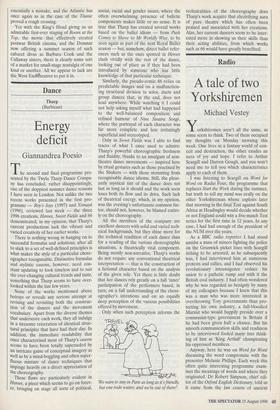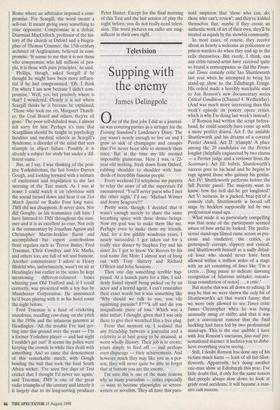Radio
A tale of two Yorkshiremen
Michael Vestey
Yorkshiremen aren't all the same, as some seem to think. Two of them occupied my thoughts on Monday morning this week. One lives in a fantasy world of con- ceit and destruction, the other exudes an aura of joy and hope. I refer to Arthur Scargill and Darren Gough, and you won't need me to tell you which characteristics apply to each of them.
I was listening to Scargill on Word for Word on Radio Four, the programme that replaces Start the Week during the summer, but truth to tell my mind was really on the other Yorkshireman whose exploits later that morning in the final Test against South Africa at Headingley would decide whether or not England could win a five-match Test series for the first time in 12 years. In any case, I had had enough of the president of the NUM over the years.
As a BBC radio reporter I had stood amidst a mass of miners fighting the police on the Grunwick picket lines with Scargill itching to be arrested, as he subsequently was, I had interviewed him at numerous protests and rallies, and I had observed his revolutionary intransigence reduce his union to a pathetic rump and with it the British coal industry. I had often wondered why he was regarded so benignly by many of my colleagues because I knew that this was a man who was more interested in overthrowing Tory governments than pro- tecting his own industry, a full-bloodied Marxist who would happily preside over a communist-type government in Britain if he had been given half a chance. But his smooth communication skills and readiness to be interviewed fooled many into think- ing of him as 'King Arthe championing his oppressed members.
Anyway, here he was on Word for Word discussing the word compromise with the presenter Melanie Phillips. Each week this often quite interesting programme exam- ines the meanings of words and where they originated. Dr Robert Simpson, chief edi- tor of the Oxford English Dictionary, told us it came from the law courts of ancient Rome where an arbitrator imposed a com- promise. For Scargill, the word meant a sell-out. It meant giving away something to your opponent. Compromise is a defeat. Diarmiad MacCulloch, professor of the his- tory of the church at Oxford and a biogra- pher of Thomas Cranmer, the 17th-century architect of Anglicanism, believed in com- promise. 'It seems to me that it is not those who compromise who kill millions of peo- ple, it is those with pure principles,' he said.
Phillips, though, asked Scargill if he thought he might have been more influen- tial if he had compromised. 'Oh, I think I'm where I am now because I didn't com- promise.' Well, yes, but precisely where is that? I wondered. Clearly it is not where Scargill thinks he is because he explained, `Those who took me on, Margaret Thatch- er, the Coal Board and others, they're all gone.' The poor self-deluded man, I almost felt sorry for him. Perhaps it's time that Scargillism should be taught in psychology faculties and medical schools as Scargill's Syndrome, a disorder of the mind that sees triumph in abject failure. Possibly it is already a subject for study but under a dif- ferent name.
But, as I say, I was thinking of the posi- tive Yorkshireman, the fast bowler Darren Gough, and looking forward with a mixture of excitement and trepidation to the last morning of the Test match. As I was at home I could watch it on television with the sound turned down and hear it on Test Match Special on Radio Four long wave. TMS did not disappoint. It never does. Nor did Goughy, as his teammates call him. I have listened to TMS throughout the sum- mer and it is as excellent as ever. Not only is the commentary by Jonathan Agnew and Christopher Martin-Jenkins fluent and accomplished but expert contributions from regulars such as Trevor Bailey, Fred Trueman, Chris Cowdrey and Vic Marks, and others too, are full of wit and humour. Another commentator I adore is Henry Blofeld who, unfortunately, wasn't on air at Headingley but earlier in the series he kept mentioning different-coloured buses whizzing past Old Trafford and, if I recall correctly, was presented with a toy bus by Manchester Corporation. He announced he'd been playing with it in his hotel room the night before.
Fred Trueman is a fund of cricketing anecdotes, recalling cow-dung on the pitch in the 1950s and the infamous gatemen at Headingley. 'All the trouble I've had get- ting into this ground over the years — I'm a former Yorkshire player — and last night I couldn't get out!' It seems the police were keeping the crowds in while they dealt with something. And so came the denouement of this remarkable match, with Gough bowling the ball that took the final South Africa wicket. 'I've seen five days of Test cricket that I thought I'd never see again,' said Trueman. TMS is one of the great radio triumphs of the century and latterly it is largely due to its long-serving producer Peter Baxter. Except for the final morning of this Test and the last session of play the night before, you do not really need televi- sion. The word pictures on radio are mag- nificent in their own right.



























































 Previous page
Previous page